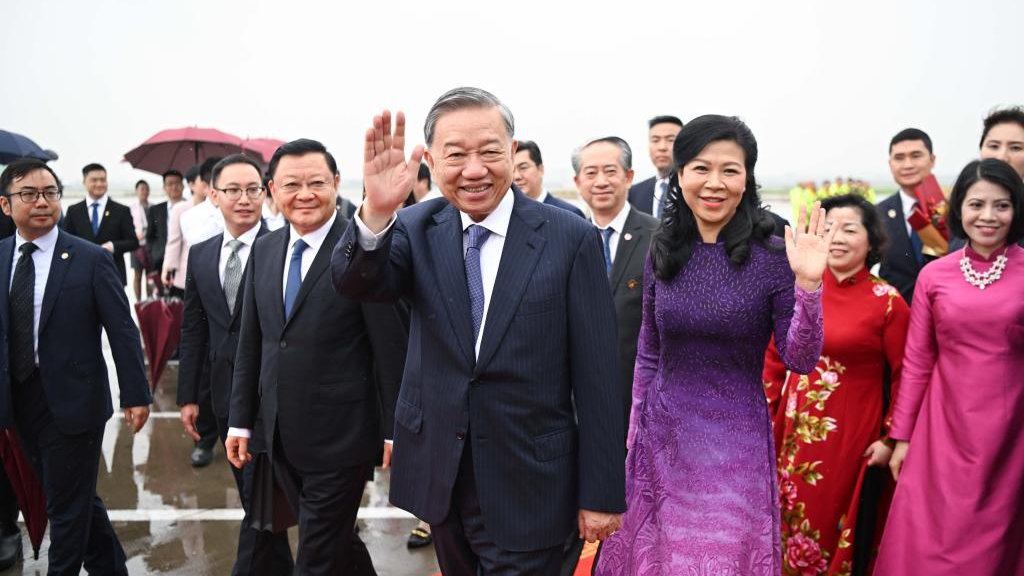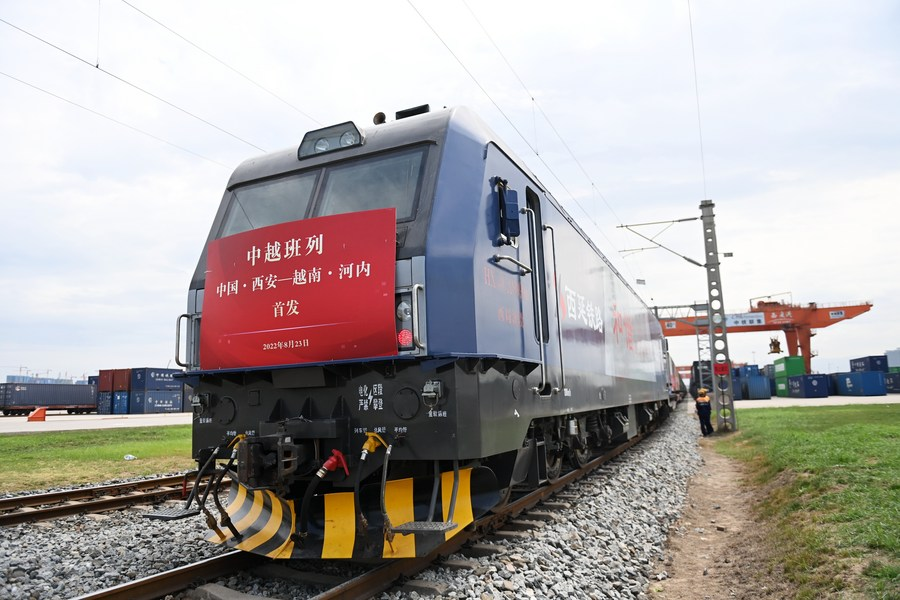
General Secretary of the Communist Party of Vietnam Central Committee and Vietnamese President To Lam arrives in Guangzhou, south China's Guangdong Province, and starts his state visit to China, August 18, 2024. [Photo/Xinhua]
By Gao Lei, Xia Lu
To Lam, general secretary of the Communist Party of Vietnam (CPV) Central Committee and Vietnamese president, has arrived in China for his first state visit and has met with General Secretary of the Communist Party of China Central Committee and Chinese President Xi Jinping. During the past decade, top leaders of these two geographically neighboring and ideologically comrade-like countries have had many rounds of exchange visits and diplomatic interactions, aimed at further deepening and elevating their comprehensive strategic cooperative partnership and building a China-Vietnam community with a shared future that carries strategic significance.
Shared past lays down foundation for cooperation
China and Vietnam experienced a similar modern history during the 19th and 20th centuries of fighting against Western colonialism and imperialism that lasted for roughly 100 years in both countries. Resembling the aggression launched by Britain against China in 1840, the French invasion of Vietnam in 1858 led to a series of notorious unequal treaties that made Vietnam finally end up as a French protectorate in 1885.
Just as the Chinese people, with unyielding spirit, waged one revolutionary struggle after another against imperialism and feudalism, the Vietnamese never ceased to fight against colonialist and imperialist powers to gain their independence and liberation. The late Vietnamese leader Ho Chi Minh started his revolutionary activities in Guangzhou in 1925 and formally founded the CPV in Hong Kong in 1930. He then led the famous August Revolution and declared the founding of the Democratic Republic of Vietnam (DRV) in September 1945.
However, Vietnam still could not get rid of the influence of Western imperialism. Yet in 1949, the founding of the People's Republic of China and the success of the Chinese revolution led by the Communist Party of China created new international dynamics for the Vietnamese liberation cause. During that time, despite urgent domestic development tasks and severe international pressure, the Chinese government and Chinese people still selflessly supported the Vietnamese people by providing moral and material aid. With this and other related elements, the DRV finally liberated its southern part and established the Socialist Republic of Vietnam (SRV) in 1976.
Shared future needed to be further consolidated
In the early days of the SRV, the country faced numerous challenges. To promote national development, Vietnam, much like China's reform and opening-up in the 1970s, implemented comprehensive reforms known as Doi Moi in the 1980s, which centered on combining market mechanisms with socialist principles.
From then on until 2016, when the CPV held its 12th National Congress, Vietnam experienced substantial change in all respects, transforming itself from being an underdeveloped country with an outdated material-technological base, backward socio-economic infrastructures, and low-level development, into a middle-income developing country – its culture and society continuously developed, its population's material and spiritual living standards improved, breakthroughs in Party-building and the building of a political system achieved, its all-nation unity unceasingly consolidated, and its political and social situation stabilized.

A China-Vietnam freight train pulls out of Xi'an international port in Xi'an, northwest China's Shaanxi Province, August 23, 2022. [Photo/Xinhua]
According to official data, Vietnam's GDP in 2023 reached about $433.3 billion in total and nearly $4,300 per capita, maintaining an over 5 percent annual growth rate; while China's GDP in 2023 reached $17.7 trillion in total and about $12,555 per capita, maintaining a 5.2 percent annual growth rate. With this achievement in hand, one can argue that the 40-plus-years of reform and opening-up in China and almost-40-year Doi Moi in Vietnam attest to the adaptive capability of both communist parties and superiority of the socialist system, and that modernization in developing countries should not and will not be realized in a so-called standardized path.
In spite of their sound achievements, both countries and parties have also realized that the international and domestic landscape provide many opportunities and advantages as well as hardships and challenges. In terms of international affairs, both countries shall work together in building a community with a shared future and realizing the Global Development Initiative, the Global Security Initiative and the Global Civilization Initiative. In addition, both countries should uphold mutual respect, equality, reciprocity and win-win cooperation, respect each other's sovereignty and territorial integrity, and resolve differences through peaceful means.
In terms of domestic affairs, both China and Vietnam should put prosperity and development as well as the people's well-being as their priority, making full use of industry complementarity and expanding bilateral trade in a balanced and sustainable manner.
Apart from that, both parties should cooperate more in Party building: to enhance the Party's leadership capacity and governing capability in an ever-changing situation, and to fight against the degradation of political ideology, morality and lifestyle by maintaining mentalities of self-evolution and self-transformation, and launching an uncompromising fight against corruption, wastefulness, pointless formalities and bureaucratism, among others.
The Chinese-Vietnamese relationship in the next couple of decades is by no means a merely diplomatic term; it will be an example of a new pattern of cooperation between two socialist countries facing challenges and tasks of modernization based on a similar historical trajectory and common international environment.
Gao Lei, a special commentator for CGTN, is an associate professor at the Center for Xi Jinping Thoughts on Opening-up, Research Institute of Globalization and China's Modernization, University of International Business & Economics. Xia Lu, a special commentator for CGTN, is a research fellow at the Chongyang Institute for Financial Studies, National Academy for Development & Strategy, the Academy of Xi Jinping Thoughts on Socialism with Chinese Characteristics for a New Era, Renmin University of China.

 中文
中文



